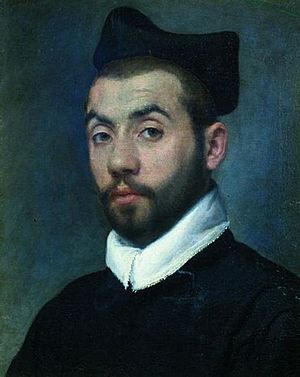Clément Marot facts for kids
Clément Marot (born November 23, 1496 – died September 12, 1544) was a famous French Renaissance poet. He is known for his clever poems and for translating the Psalms into French, which became very popular.
Contents
Life of a Poet
Early Years and Education
Clément Marot was born in Cahors, France, in the winter of 1496 or 1497. His father, Jean Marot, was also a poet from Normandy. Jean worked as a special writer for Anne of Brittany, the Queen of France.
Clément moved to France in 1506. He probably went to the University of Paris and then started studying law. His father taught him how to write poems in the popular styles of the time.
At first, Clément wrote in a very fancy and complicated style, like other poets called "rhétoriqueurs." They used old-fashioned language and complex poem structures. However, Clément later helped change this style to be simpler and more natural. He soon stopped studying law and became an assistant to a nobleman, which helped him join the royal court.
Working for the French Royal Family
By 1514, even before Francis I became king, Clément was already writing poems for him. Soon after, he became the official poet for Queen Claude.
In 1519, he joined the group around Marguerite de Navarre, who was the king's sister and a great supporter of artists. Clément was also a favorite of King Francis himself. He even attended the famous Field of the Cloth of Gold meeting in 1520, where he wrote poems about it. The next year, he wrote about the difficulties of war while in Flanders.
During this time, Clément's poetry began to change. It became much less artificial and more natural.
Troubles in Paris
In 1524, Marot went with King Francis on a difficult military trip to Italy. The king was captured, but Marot returned to Paris by early 1525.
At this time, some people in power started to oppose new ideas in humanism and religion. Marot, who was not always careful, was arrested in February 1526. He was accused of having beliefs that went against the official church. This was just the start of his problems. A friendly church leader, helped by Marguerite, arranged for his release before Easter. His time in prison led him to write a strong poem called Enfer (meaning "hell").
Around this time, his father died. Marot then became a valet de chambre (a personal attendant) to the king. He was part of the royal household by 1528. In 1530, he likely got married. The next year, he was in trouble again for trying to help a prisoner. He was released after writing one of his most famous poems to the king, asking for his freedom.
In 1532, he published his first collection of poems called Adolescence Clémentine. It was very popular and reprinted many times. However, in 1534, Marot's enemies linked him to the "Affair of the Placards," where posters criticizing the Catholic Church were put up. This time, he had to flee Paris.
Life in Exile
Marot first went to Nérac, the court of Navarre. Then he traveled to Renée, duchess of Ferrara, who supported the Protestant Reformation in France. Her lands were outside France, so she could offer him more protection. While in Ferrara, Marot wrote his famous Blasons. A blason is a poem that describes something in great detail, either praising it or criticizing it. Marot's blasons inspired many other poets in France to write similar poems.
Duchess Renée could not convince her husband to share her views, so Marot had to leave Ferrara. He went to Venice. Eventually, the Pope asked King Francis I to be less harsh on people with Protestant beliefs. Marot was allowed to return to Paris if he promised to change his views. He returned and publicly stated he would give up his "errors" in Lyon. In 1539, King Francis gave him a house.
During this time, Marot published his famous and very important translations of the Psalms (songs from the Bible). These translations became incredibly popular. People at court and in the city sang them. It is believed that these translations helped spread the ideas of the Protestant Reformation in France. Marot's Psalm translations continued to be sung by Protestant groups for centuries.
Later Life and Legacy
At the same time, Marot had a literary argument with another poet named François de Sagon. Poets in France took sides, calling themselves "Marotiques" or "Sagontiques." Marot won the argument with his wit, but it created bad feelings against him.
Marot also helped edit the works of another poet, François Villon.
Even though his Psalm translations were published with the king's permission, the Sorbonne (a famous university) still did not like translations of the Bible into French. By 1543, it was clear that Marot could no longer rely on the king's protection. So, he left for Geneva. After working on the Psalms there, he moved to Piedmont as Calvin became more powerful in Geneva.
Clément Marot died in Turin, Italy, in the autumn of 1544. He was buried in the Turin Cathedral.
Influence on Music and Literature
Many of Marot's poems were turned into songs, especially by his friend Claudin de Sermisy.
The book Le Ton beau de Marot by Douglas Hofstadter talks about the challenges of translation. It includes many different translations of Marot's poem A une damoyselle malade.
Composers like Maurice Ravel and George Enescu also created songs using Marot's poems.
Wilhelm Killmayer set some of Marot's poems to music in his song cycles Rêveries (1953) and Blasons anatomiques du corps féminin (1968).
Images for kids
See also
 In Spanish: Clément Marot para niños
In Spanish: Clément Marot para niños
 | Jackie Robinson |
 | Jack Johnson |
 | Althea Gibson |
 | Arthur Ashe |
 | Muhammad Ali |



